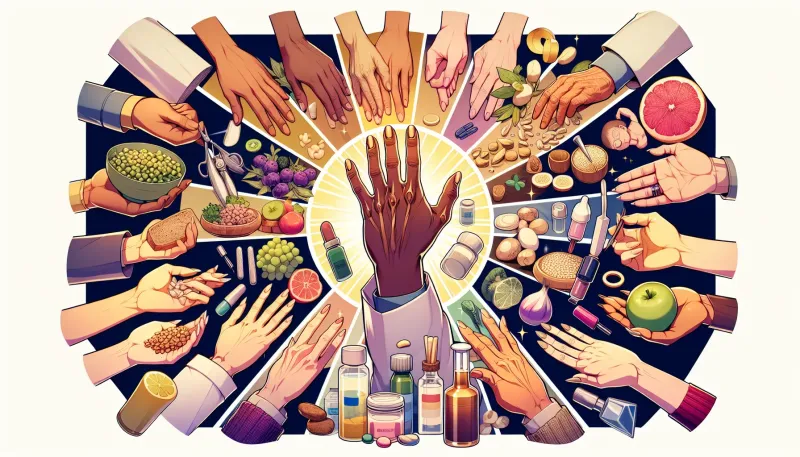The Ultimate Guide to Nail Health and Aging: Tips for Stronger Nails

Discover essential tips and strategies for maintaining nail health and combating the effects of aging. Learn how to keep your nails strong and beautiful at any age.
Nail health and aging are often overlooked aspects of personal care. Just as our skin and hair benefit from special attention as we age, our nails also need care to stay strong and healthy. In this comprehensive guide, we’ll explore the science behind nail aging, common issues, and actionable tips for maintaining nail health at any age.
Understanding Nail Aging
How Nails Change with Age
Our nails, much like our skin and hair, undergo changes as we age. These changes include slower growth rates, a thicker or more brittle texture, and even discoloration. Understanding these changes can help you take proactive steps to maintain nail health.
Common Symptoms of Aging Nails
- Brittleness: Nails may become dry and prone to splitting.
- Thickening: Nails may thicken, often becoming more difficult to trim.
- Discoloration: Older nails might develop a yellowish tint.
- Ridges: Vertical ridges may appear on the nail surface.
Key Factors Affecting Nail Health
Nutrition
Proper nutrition is essential for maintaining healthy nails. Nutrients like biotin, vitamin E, and iron play crucial roles in nail health. Incorporating foods rich in these nutrients can help strengthen your nails:
- Biotin: Found in eggs, nuts, and seeds.
- Iron: Found in leafy greens, beans, and red meat.
- Vitamin E: Found in almonds, sunflower seeds, and spinach.
Hydration
Just as hydration is vital for your skin, it is equally important for your nails. Drinking sufficient water and using moisturizing hand lotions can prevent your nails from becoming dry and brittle.
Environmental Factors
Environmental factors, including frequent exposure to water, chemicals, and extreme temperatures, can negatively impact nail health. Wearing gloves during household chores and using mild, sulfate-free cleansers can help protect your nails.
Tips for Stronger Nails
Regular Trimming and Filing
Keep your nails trimmed and filed to prevent snagging and breaking. Use a glass nail file rather than a metal one to minimize damage.
Moisturize Your Cuticles
Regularly moisturizing your cuticles with essential oils or a specialized cuticle cream helps prevent dryness and promotes nail growth.
Natural Nail Treatments
Consider using natural treatments such as olive oil or coconut oil massages. These oils can penetrate the nail bed and provide much-needed nourishment.
Avoid Harsh Chemicals
Limit your exposure to harsh chemicals found in commercial nail polish removers and nail treatments. Opt for acetone-free removers and polishes that are free from formaldehyde and other harmful substances.
Dietary Supplements
Sometimes, our diet may not provide all the required nutrients. In such cases, supplements like biotin or a daily multivitamin can be beneficial. Always consult a healthcare provider before starting any supplement regimen.
Addressing Specific Nail Problems
Brittle Nails
For brittle nails, regular moisturizing and the use of nail hardeners can provide relief. A diet rich in biotin and vitamin E also helps strengthen brittle nails.
Thickened Nails
Thickened nails can often result from fungal infections. Antifungal treatments, both oral and topical, are effective. If the thickening persists, it is advisable to consult a dermatologist.
Discolored Nails
Discoloration can be a sign of various issues, including fungal infections or nutritional deficiencies. Whitening treatments and addressing the underlying cause (like insufficient iron intake) can help resolve discoloration.
When to Seek Professional Help
It's important to know when professional intervention is necessary. If you experience any of the following, consult a healthcare provider:
- Severe or persistent nail pain.
- Discoloration spreading across several nails.
- Signs of infection, such as swelling or pus.
- Changes in nail structure that don't improve with home treatments.
Conclusion
Maintaining nail health is an ongoing process that requires attention to nutrition, hydration, and care routines. By understanding the changes that come with aging and taking proactive steps to address these changes, you can ensure that your nails remain strong and healthy at any age. Implementing the tips and strategies discussed in this guide can go a long way in promoting nail health and combating the effects of aging.



























